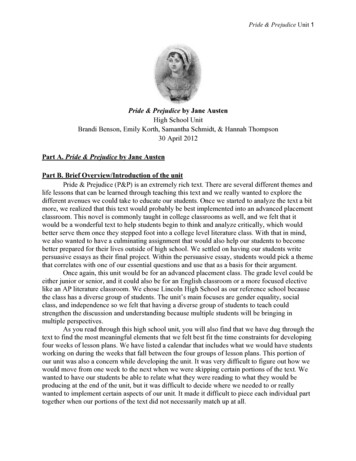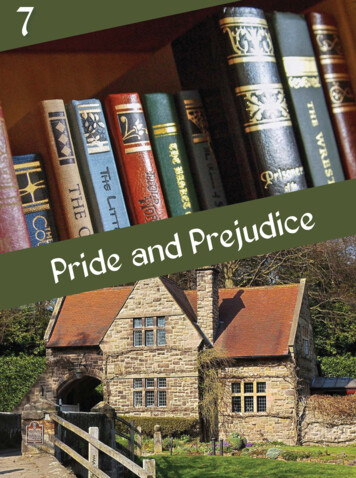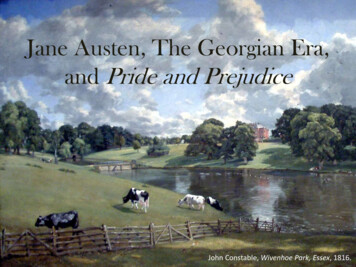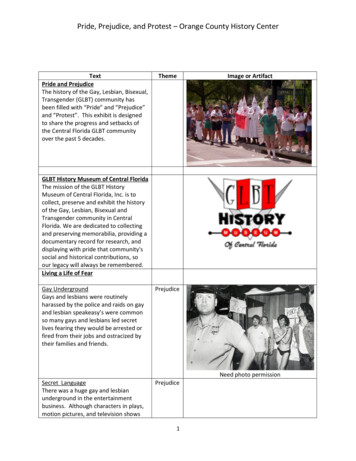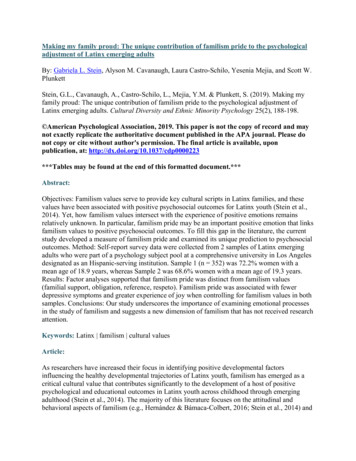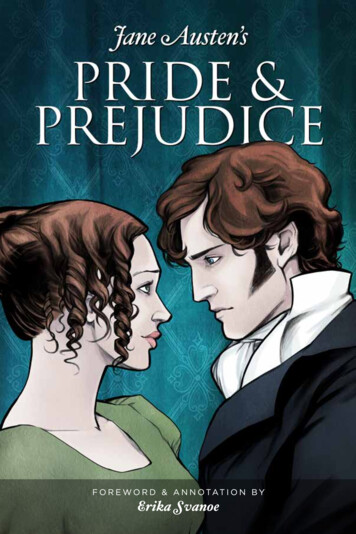
Transcription
1
PrideandPrejudice:a novel.-7by theauthor of “Sense and Sensibility”-7Foreword and notes by Erika Svanoe.Printed as a companion to “Marrying Mr. Darcy.”1813–2013.2
Pride and Prejudice: Marrying Mr. Darcy editionWith annotation and notes by Erika SvanoeFirst printing. February, 2014.Published by Evensen Creative.isbn: 978-0-9890104-4-3Copyright 2014 Erika Svanoe, all rights reserved.Cover art, jacket design, and layout by Erik A. EvensenBack cover copy uses material from the Wikipedia article“Jane Austen,” which is released under the Creative CommonsAttribution-Share-Alike License 3.0.This special edition was paid for expressly through Kickstarter support,as a companion to the card game, Marrying Mr. Darcy.Printed by CreateSpace.3
F o r e wo r dby Erika Svanoedesigner of Marrying Mr. Darcy: the Pride and Prejudice Card GameI am a Pride and Prejudice fanatic. I’ve seen every movie, television series, andwatched or read too many adaptations to count. Eventually, I got the itch to createmy own Pride and Prejudice inspired thing. I tried writing some fan-fiction at first,but that was not really my cup of tea. A few years earlier my husband had writtenhis masters thesis on game design and created an educational board game aboutdiabetes management. I watched him go through the process and, like any goodspouse, proofread his paper. This combination of experiences gave me the idea tocreate a game based on my favorite book. I decided this would be the direction tofocus my creative energies, and so I designed Marrying Mr. Darcy: the Pride andPrejudice Card Game.Being an Austen super-fan, I thought about making a game that otherAusten fans would want to play. What does every Janeite want to experience?There were two main decisions I made early on that ended up staying through theentire design process. First, I decided that the game should have a role-playingelement where you choose which lady you want to play as. Don’t we all secretlywant to be Elizabeth, or see a bit of ourselves in one of the other Bennet sisters?(Alas, I have more Mary in me than Elizabeth.) The other convenient thing aboutplaying a game as one of the novel’s ladies is that they were in a relatively weakposition in society. They had limited options of how they could secure their owncomfort. The entire novel is Austen satirizing a society where marriage was reallythe only respectable option for these characters. So the second idea that reallystuck was that a main goal of the game should be marriage. Since the centraldrama of the book is that the women must marry, this should be incorporatedinto the win scenario of the game.As the game developed, there were three other main mechanics that tookshape in the final version, and were all drawn from either the book itself orRegency society. First, the plot points of the story manifested in the Event carddeck. There are several critical plot points in the book, such as Lydia eloping,Darcy’s surprise proposal, and Bingley leaving Netherfield for London. Just likein the book, each of these events has significant consequences in the game andin some cases can force players to rethink their strategy.The second mechanic relates to resource management. Daughters of thelanded gentry, such as the Bennet sisters, were not able to take on employment.These ladies spent their time sewing, practicing the piano, drawing, and becoming4
as accomplished as they could. Much of this activity was intended to make themmore attractive as potential wives for the gentlemen who might court them, andthese activities often ceased once they were actually married. In the game, playersmust build up their character with various traits to earn game winning points fortheir own accomplishments, as well as to attract the interest of the various suitors.Finally, the ending proposal stage incorporates a press your luck mechanic.In all of Austen’s novels, it is the man who always holds the power to propose.In the game, players must roll the dice to see if a suitor proposes to them, so theoutcome is outside the player’s control. However, as Elizabeth demonstrates withMr. Collins, a lady always has the power to either accept or decline. This holdstrue in the game as well. Players will likely be faced with the decision of whetherto accept an early proposal from a suitor worth fewer points, or decline and taketheir chances hoping for another proposal down the line.All of these game mechanics in Marrying Mr. Darcy were chosen to bestreplicate the experience of being one of these female characters in the book.It is meant to create an immersive experience where players must act with thelimited power they have to secure their heroine’s future happiness. The event cardsreplicate the everyday occurrences of Regency life, as well as the plot of the storyitself. Even the choice to make the game playable using cards is meant to replicatethe experience of sitting at a card table to entertain your guests after supper as theydo so often in Pride and Prejudice.This edition of Pride and Prejudice is intended to be a companion to thegame, Marrying Mr. Darcy. The annotation directs the reader to endnotes, whichillustrate how a certain card, strategy, or mechanic in the game was inspired bythat particular element in the novel. This highlights some of the stratagems of thevarious characters as they attempt to secure their own comfort and happiness inthe book, as players might attempt to do while playing the game. The name of thecard referenced in the note is set apart by quotation marks to distinguish it fromthe surrounding text.Thank you to the multitude of Kickstarter backers who supported this project,and without whom this edition would not be possible.5
Chapter 1It is a truth universally acknowledged, that a single man in possession of a goodfortune, must be in want of a wife.However little known the feelings or views of such a man may be on hisfirst entering a neighbourhood, this truth is so well fixed in the minds of thesurrounding families, that he is considered the rightful property of some one orother of their daughters.“My dear Mr. Bennet,” said his lady to him one day, “have you heard thatNetherfield Park is let at last?”Mr. Bennet replied that he had not.“But it is,” returned she; “for Mrs. Long has just been here, and she told me allabout it.”Mr. Bennet made no answer.“Do you not want to know who has taken it?” cried his wife impatiently.“You want to tell me, and I have no objection to hearing it.”This was invitation enough.“Why, my dear, you must know, Mrs. Long says that Netherfield is taken bya young man of large fortune from the north of England; that he came down onMonday in a chaise and four to see the place, and was so much delighted with it,that he agreed with Mr. Morris immediately; that he is to take possession beforeMichaelmas, and some of his servants are to be in the house by the end of next week.”“What is his name?”“Bingley.”“Is he married or single?”“Oh! Single, my dear, to be sure! A single man of large fortune; four or fivethousand a year. What a fine thing for our girls!”“How so? How can it affect them?”“My dear Mr. Bennet,” replied his wife, “how can you be so tiresome! You mustknow that I am thinking of his marrying one of them.”“Is that his design in settling here?”“Design! Nonsense, how can you talk so! But it is very likely that he may fall inlove with one of them, and therefore you must visit him as soon as he comes.”“I see no occasion for that. You and the girls may go, or you may send them bythemselves, which perhaps will be still better, for as you are as handsome as any ofthem, Mr. Bingley may like you the best of the party.”“My dear, you flatter me. I certainly have had my share of beauty, but I donot pretend to be anything extraordinary now. When a woman has five grown-up6
daughters, she ought to give over thinking of her own beauty.”“In such cases, a woman has not often much beauty to think of.”“But, my dear, you must indeed go and see Mr. Bingley when he comes intothe neighbourhood.”“It is more than I engage for, I assure you.”“But consider your daughters. Only think what an establishment it would befor one of them. Sir William and Lady Lucas are determined to go, merely on thataccount, for in general, you know, they visit no newcomers. Indeed you must go, forit will be impossible for us to visit him if you do not.”“You are over-scrupulous, surely. I dare say Mr. Bingley will be very glad to seeyou; and I will send a few lines by you to assure him of my hearty consent to hismarrying whichever he chooses of the girls; though I must throw in a good wordfor my little Lizzy.”“I desire you will do no such thing. Lizzy is not a bit better than the others; andI am sure she is not half so handsome as Jane, nor half so good-humoured as Lydia.But you are always giving her the preference.”“They have none of them much to recommend them,” replied he; “they are allsilly and ignorant like other girls; but Lizzy has something more of quickness thanher sisters.”1“Mr. Bennet, how can you abuse your own children in such a way? You takedelight in vexing me. You have no compassion for my poor nerves.”“You mistake me, my dear. I have a high respect for your nerves. They are myold friends. I have heard you mention them with consideration these last twentyyears at least.”“Ah, you do not know what I suffer.”“But I hope you will get over it, and live to see many young men of fourthousand a year come into the neighbourhood.”“It will be no use to us, if twenty such should come, since you will not visit them.”“Depend upon it, my dear, that when there are twenty, I will visit them all.”Mr. Bennet was so odd a mixture of quick parts, sarcastic humour, reserve, andcaprice, that the experience of three-and-twenty years had been insufficient to makehis wife understand his character. Her mind was less difficult to develop. She was awoman of mean understanding, little information, and uncertain temper. When shewas discontented, she fancied herself nervous. The business of her life was to get herdaughters married; its solace was visiting and news.7
Chapter 2Mr. Bennet was among the earliest of those who waited on Mr. Bingley. Hehad always intended to visit him, though to the last always assuring his wife that heshould not go; and till the evening after the visit was paid she had no knowledgeof it. It was then disclosed in the following manner. Observing his second daughteremployed in trimming a hat, he suddenly addressed her with:“I hope Mr. Bingley will like it, Lizzy.”“We are not in a way to know what Mr. Bingley likes,” said her motherresentfully, “since we are not to visit.”“But you forget, mamma,” said Elizabeth, “that we shall meet him at theassemblies, and that Mrs. Long promised to introduce him.”“I do not believe Mrs. Long will do any such thing. She has two nieces of herown. She is a selfish, hypocritical woman, and I have no opinion of her.”“No more have I,” said Mr. Bennet; “and I am glad to find that you do notdepend on her serving you.”Mrs. Bennet deigned not to make any reply, but, unable to contain herself,began scolding one of her daughters.“Don’t keep coughing so, Kitty, for Heaven’s sake! Have a little compassion onmy nerves. You tear them to pieces.”“Kitty has no discretion in her coughs,” said her father; “she times them ill.”“I do not cough for my own amusement,” replied Kitty fretfully. “When is yournext ball to be, Lizzy?”“To-morrow fortnight.”“Aye, so it is,” cried her mother, “and Mrs. Long does not come back till theday before; so it will be impossible for her to introduce him, for she will not knowhim herself.”“Then, my dear, you may have the advantage of your friend, and introduce Mr.Bingley to her.”“Impossible, Mr. Bennet, impossible, when I am not acquainted with himmyself; how can you be so teasing?”“I honour your circumspection. A fortnight’s acquaintance is certainly very little.One cannot know what a man really is by the end of a fortnight. But if we do notventure somebody else will; and after all, Mrs. Long and her nieces must stand theirchance; and, therefore, as she will think it an act of kindness, if you decline theoffice, I will take it on myself.”The girls stared at their father. Mrs. Bennet said only, “Nonsense, nonsense!”“What can be the meaning of that emphatic exclamation?” cried he. “Do you8
consider the forms of introduction, and the stress that is laid on them, as nonsense?I cannot quite agree with you there. What say you, Mary? For you are a young ladyof deep reflection, I know, and read great books and make extracts.”Mary wished to say something sensible, but knew not how.“While Mary is adjusting her ideas,” he continued, “let us return to Mr. Bingley.”“I am sick of Mr. Bingley,” cried his wife.“I am sorry to hear that; but why did not you tell me that before? If I had knownas much this morning I certainly would not have called on him. It is very unlucky;but as I have actually paid the visit, we cannot escape the acquaintance now.”The astonishment of the ladies was just what he wished; that of Mrs. Bennetperhaps surpassing the rest; though, when the first tumult of joy was over, she beganto declare that it was what she had expected all the while.“How good it was in you, my dear Mr. Bennet! But I knew I should persuadeyou at last. I was sure you loved your girls too well to neglect such an acquaintance.Well, how pleased I am! and it is such a good joke, too, that you should have gonethis morning and never said a word about it till now.”“Now, Kitty, you may cough as much as you choose,” said Mr. Bennet; and, ashe spoke, he left the room, fatigued with the raptures of his wife.“What an excellent father you have, girls!” said she, when the door was shut. “Ido not know how you will ever make him amends for his kindness; or me, either,for that matter. At our time of life it is not so pleasant, I can tell you, to be makingnew acquaintances every day; but for your sakes, we would do anything. Lydia, mylove, though you are the youngest, I dare say Mr. Bingley will dance with you atthe next ball.”“Oh!” said Lydia stoutly, “I am not afraid; for though I am the youngest, I’mthe tallest.”The rest of the evening was spent in conjecturing how soon he would return Mr.Bennet’s visit, and determining when they should ask him to dinner.Chapter 3Not all that Mrs. Bennet, however, with the assistance of her five daughters,could ask on the subject, was sufficient to draw from her husband any satisfactorydescription of Mr. Bingley. They attacked him in various ways—with barefacedquestions, ingenious suppositions, and distant surmises; but he eluded the skill ofthem all, and they were at last obliged to accept the second-hand intelligence of9
their neighbour, Lady Lucas. Her report was highly favourable. Sir William hadbeen delighted with him. He was quite young, wonderfully handsome, extremelyagreeable, and, to crown the whole, he meant to be at the next assembly with a largeparty. Nothing could be more delightful! To be fond of dancing was a certain steptowards falling in love; and very lively hopes of Mr. Bingley’s heart were entertained.“If I can but see one of my daughters happily settled at Netherfield,” said Mrs.Bennet to her husband, “and all the others equally well married, I shall have nothingto wish for.”In a few days Mr. Bingley returned Mr. Bennet’s visit, and sat about ten minuteswith him in his library. He had entertained hopes of being admitted to a sight of theyoung ladies, of whose beauty he had heard much; but he saw only the father. Theladies were somewhat more fortunate, for they had the advantage of ascertainingfrom an upper window that he wore a blue coat, and rode a black horse.An invitation to dinner was soon afterwards dispatched; and already had Mrs.Bennet planned the courses that were to do credit to her housekeeping, when ananswer arrived which deferred it all. Mr. Bingley was obliged to be in town thefollowing day, and, consequently, unable to accept the honour of their invitation,etc. Mrs. Bennet was quite disconcerted. She could not imagine what business hecould have in town so soon after his arrival in Hertfordshire; and she began to fearthat he might be always flying about from one place to another, and never settledat Netherfield as he ought to be. Lady Lucas quieted her fears a little by starting theidea of his being gone to London only to get a large party for the ball; and a reportsoon followed that Mr. Bingley was to bring twelve ladies and seven gentlemenwith him to the assembly.2 The girls grieved over such a number of ladies, but werecomforted the day before the ball by hearing, that instead of twelve he broughtonly six with him from London—his five sisters and a cousin. And when the partyentered the assembly room it consisted of only five altogether—Mr. Bingley, his twosisters, the husband of the eldest, and another young man.Mr. Bingley was good-looking and gentlemanlike; he had a pleasantcountenance, and easy, unaffected manners. His sisters were fine women, with anair of decided fashion. His brother-in-law, Mr. Hurst, merely looked the gentleman;but his friend Mr. Darcy soon drew the attention of the room by his fine, tall person,handsome features, noble mien, and the report which was in general circulationwithin five minutes after his entrance, of his having ten thousand a year. Thegentlemen pronounced him to be a fine figure of a man, the ladies declared he wasmuch handsomer than Mr. Bingley, and he was looked at with great admiration forabout half the evening, till his manners gave a disgust which turned the tide of hispopularity; for he was discovered to be proud; to be above his company, and abovebeing pleased; and not all his large estate in Derbyshire could then save him from10
having a most forbidding, disagreeable countenance, and being unworthy to becompared with his friend.Mr. Bingley had soon made himself acquainted with all the principal peoplein the room; he was lively and unreserved, danced every dance, was angry that theball closed so early, and talked of giving one himself at Netherfield. Such amiablequalities must speak for themselves. What a contrast between him and his friend!Mr. Darcy danced only once with Mrs. Hurst and once with Miss Bingley, declinedbeing introduced to any other lady, and spent the rest of the evening in walkingabout the room, speaking occasionally to one of his own party. His character wasdecided. He was the proudest, most disagreeable man in the world, and everybodyhoped that he would never come there again. Amongst the most violent againsthim was Mrs. Bennet, whose dislike of his general behaviour was sharpened intoparticular resentment by his having slighted one of her daughters.Elizabeth Bennet had been obliged, by the scarcity of gentlemen, to sit downfor two dances; and during part of that time, Mr. Darcy had been standing nearenough for her to hear a conversation between him and Mr. Bingley, who camefrom the dance for a few minutes, to press his friend to join it.“Come, Darcy,” said he, “I must have you dance. I hate to see you standingabout by yourself in this stupid manner. You had much better dance.”“I certainly shall not. You know how I detest it, unless I am particularlyacquainted with my partner. At such an assembly as this it would be insupportable.Your sisters are engaged, and there is not another woman in the room whom itwould not be a punishment to me to stand up with.”“I would not be so fastidious as you are,” cried Mr. Bingley, “for a kingdom!Upon my honour, I never met with so many pleasant girls in my life as I have thisevening; and there are several of them you see uncommonly pretty.”“You are dancing with the only handsome girl in the room,” said Mr. Darcy,looking at the eldest Miss Bennet.“Oh! She is the most beautiful creature I ever beheld! But there is one of hersisters sitting down just behind you, who is very pretty, and I dare say very agreeable.Do let me ask my partner to introduce you.”“Which do you mean?” and turning round he looked for a moment atElizabeth, till catching her eye, he withdrew his own and coldly said: “She istolerable, but not handsome enough to tempt me; I am in no humour at presentto give consequence to young ladies who are slighted by other men. You hadbetter return to your partner and enjoy her smiles, for you are wasting your timewith me.”3Mr. Bingley followed his advice. Mr. Darcy walked off; and Elizabeth remainedwith no very cordial feelings toward him. She told the story, however, with great11
spirit among her friends; for she had a lively, playful disposition, which delightedin anything ridiculous.The evening altogether passed off pleasantly to the whole family. Mrs. Bennethad seen her eldest daughter much admired by the Netherfield party. Mr. Bingleyhad danced with her twice, and she had been distinguished by his sisters. Janewas as much gratified by this as her mother could be, though in a quieter way.Elizabeth felt Jane’s pleasure. Mary had heard herself mentioned to Miss Bingleyas the most accomplished girl in the neighbourhood; and Catherine and Lydia hadbeen fortunate enough never to be without partners, which was all that they had yetlearnt to care for at a ball.4 They returned, therefore, in good spirits to Longbourn,the village where they lived, and of which they were the principal inhabitants. Theyfound Mr. Bennet still up. With a book he was regardless of time; and on thepresent occasion he had a good deal of curiosity as to the event of an evening whichhad raised such splendid expectations. He had rather hoped that his wife’s views onthe stranger would be disappointed; but he soon found out that he had a differentstory to hear.“Oh! my dear Mr. Bennet,” as she entered the room, “we have had a mostdelightful evening, a most excellent ball. I wish you had been there. Jane was soadmired, nothing could be like it. Everybody said how well she looked; and Mr.Bingley thought her quite beautiful, and danced with her twice! Only think of that,my dear; he actually danced with her twice! and she was the only creature in theroom that he asked a second time. First of all, he asked Miss Lucas. I was so vexedto see him stand up with her! But, however, he did not admire her at all; indeed,nobody can, you know; and he seemed quite struck with Jane as she was going downthe dance. So he inquired who she was, and got introduced, and asked her for thetwo next. Then the two third he danced with Miss King, and the two fourth withMaria Lucas, and the two fifth with Jane again, and the two sixth with Lizzy, andthe Boulanger—”“If he had had any compassion for me,” cried her husband impatiently, “hewould not have danced half so much! For God’s sake, say no more of his partners.Oh that he had sprained his ankle in the first dance!”“Oh! my dear, I am quite delighted with him. He is so excessively handsome!And his sisters are charming women. I never in my life saw anything more elegantthan their dresses. I dare say the lace upon Mrs. Hurst’s gown—”Here she was interrupted again. Mr. Bennet protested against any descriptionof finery. She was therefore obliged to seek another branch of the subject, andrelated, with much bitterness of spirit and some exaggeration, the shocking rudenessof Mr. Darcy.“But I can assure you,” she added, “that Lizzy does not lose much by not suiting12
his fancy; for he is a most disagreeable, horrid man, not at all worth pleasing. Sohigh and so conceited that there was no enduring him! He walked here, and hewalked there, fancying himself so very great! Not handsome enough to dance with!I wish you had been there, my dear, to have given him one of your set-downs. Iquite detest the man.”Chapter 4When Jane and Elizabeth were alone, the former, who had been cautious inher praise of Mr. Bingley before, expressed to her sister just how very much sheadmired him.“He is just what a young man ought to be,” said she, “sensible, good-humoured,lively; and I never saw such happy manners!—so much ease, with such perfectgood breeding!”“He is also handsome,” replied Elizabeth, “which a young man ought likewiseto be, if he possibly can. His character is thereby complete.”“I was very much flattered by his asking me to dance a second time. I did notexpect such a compliment.”“Did not you? I did for you. But that is one great difference between us.Compliments always take you by surprise, and me never. What could be morenatural than his asking you again? He could not help seeing that you were aboutfive times as pretty as every other woman in the room. No thanks to his gallantry forthat. Well, he certainly is very agreeable, and I give you leave to like him. You haveliked many a stupider person.”“Dear Lizzy!”“Oh! you are a great deal too apt, you know, to like people in general. You neversee a fault in anybody. All the world are good and agreeable in your eyes. I neverheard you speak ill of a human being in your life.”“I would not wish to be hasty in censuring anyone; but I always speak whatI think.”“I know you do; and it is that which makes the wonder. With your good sense,to be so honestly blind to the follies and nonsense of others! Affectation of candouris common enough—one meets with it everywhere. But to be candid withoutostentation or design—to take the good of everybody’s character and make it stillbetter, and say nothing of the bad—belongs to you alone. And so you like this man’ssisters, too, do you? Their manners are not equal to his.”13
“Certainly not—at first. But they are very pleasing women when you conversewith them. Miss Bingley is to live with her brother, and keep his house; and I ammuch mistaken if we shall not find a very charming neighbour in her.”Elizabeth listened in silence, but was not convinced; their behaviour at theassembly had not been calculated to please in general; and with more quickness ofobservation and less pliancy of temper than her sister, and with a judgement toounassailed by any attention to herself, she was very little disposed to approve them.They were in fact very fine ladies; not deficient in good humour when they werepleased, nor in the power of making themselves agreeable when they chose it, butproud and conceited. They were rather handsome, had been educated in one of thefirst private seminaries in town, had a fortune of twenty thousand pounds, were inthe habit of spending more than they ought, and of associating with people of rank,and were therefore in every respect entitled to think well of themselves, and meanlyof others. They were of a respectable family in the north of England; a circumstancemore deeply impressed on their memories than that their brother’s fortune and theirown had been acquired by trade.Mr. Bingley inherited property to the amount of nearly a hundred thousandpounds from his father, who had intended to purchase an estate, but did not live todo it. Mr. Bingley intended it likewise, and sometimes made choice of his county;but as he was now provided with a good house and the liberty of a manor, it wasdoubtful to many of those who best knew the easiness of his temper, whetherhe might not spend the remainder of his days at Netherfield, and leave the nextgeneration to purchase.His sisters were anxious for his having an estate of his own; but, though hewas now only established as a tenant, Miss Bingley was by no means unwilling topreside at his table—nor was Mrs. Hurst, who had married a man of more fashionthan fortune, less disposed to consider his house as her home when it suited her.Mr. Bingley had not been of age two years, when he was tempted by an accidentalrecommendation to look at Netherfield House. He did look at it, and into it forhalf-an-hour—was pleased with the situation and the principal rooms, satisfiedwith what the owner said in its praise, and took it immediately.Between him and Darcy there was a very steady friendship, in spite of greatopposition of character. Bingley was endeared to Darcy by the easiness, openness,and ductility of his temper, though no disposition could offer a greater contrast tohis own, and though with his own he never appeared dissatisfied. On the strengthof Darcy’s regard, Bingley had the firmest reliance, and of his judgement the highestopinion. In understanding, Darcy was the superior. Bingley was by no meansdeficient, but Darcy was clever. He was at the same time haughty, reserved, andfastidious, and his manners, though well-bred, were not inviting. In that respect14
his friend had greatly the advantage. Bingley was sure of being liked wherever heappeared, Darcy was continually giving offense.The manner in which they spoke of the Meryton assembly was sufficientlycharacteristic. Bingley had never met with more pleasant people or prettier girlsin his life; everybody had been most kind and attentive to him; there had been noformality, no stiffness; he had soon felt acquainted with all the room; and, as to MissBennet, he could not conceive an angel more beautiful. Darcy, on the contrary, hadseen a collection of people in whom there was little beauty and no fashion, for noneof whom he had felt the smallest interest, and from none received either attentionor pleasure. Miss Bennet he acknowledged to be pretty, but she smiled too much.Mrs. Hurst and her sister allowed it to be so—but still they admired her andliked her, and pronounced her to be a sweet girl, and one whom they would notobject to know more of. Miss Bennet was therefore established as a sweet girl, andtheir brother felt authorized by such commendation to think of her as he chose.Chapter 5Within a short walk of Longbourn lived a family with whom the Bennets wereparticularly intimate. Sir William Lucas had been formerly in trade in Meryton,where he had made a tolerable fortune, and risen to the honour of knighthood byan address to the king during his mayoralty. The distinction had perhaps been felttoo strongly. It had given him a disgust to his business, and to his residence in asmall marke
do so often in Pride and Prejudice. This edition of Pride and Prejudice is intended to be a companion to the game, Marrying Mr. Darcy. The annotation directs the reader to endnotes, which illustrate how a certain card, strategy, or mechanic in the game was inspired by that particular element in the novel.


